Eyewitness memory isn’t as reliable as you might think. Stress can distort what you remember, while suggestive questioning can introduce false details. Poor lineup procedures often lead to misidentification, especially when witnesses are pressured. Confidence in one’s memory doesn’t guarantee accuracy, as many cases show. Understanding these factors is essential. If you want a deeper look into the impact of eyewitness testimony on the justice system, there’s more to explore.
Key Takeaways
- Eyewitness memory is susceptible to contamination from emotional bias, leading questions, and suggestive feedback, affecting the accuracy of recall.
- Lineup procedures, including simultaneous versus sequential lineups, significantly influence identification accuracy and the potential for misidentification.
- Confidence levels expressed by witnesses immediately after identification can be indicative of reliability, yet may still be misleading.
- High-stress situations can distort memory recall, highlighting the importance of low-stress environments during witness interviews for accurate testimonies.
- Notable wrongful conviction cases emphasize the critical need for scrutiny and reform in eyewitness testimony practices within the justice system.
The Nature of Eyewitness Memory
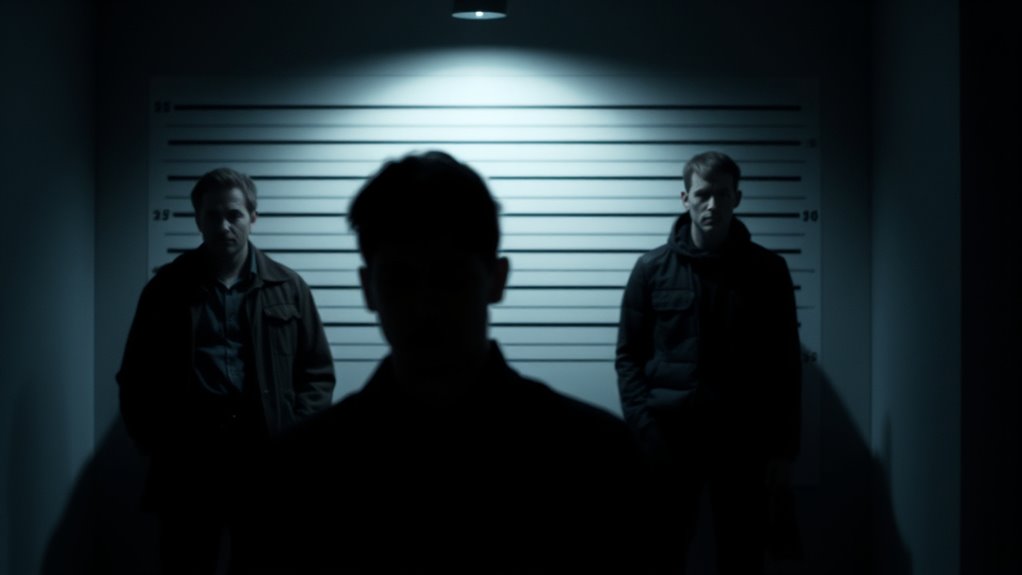
What makes eyewitness memory so fascinating yet unreliable? It’s the way your brain processes and retains information, often influenced by emotional bias. When you witness an event, your emotions can cloud your judgment, altering what you remember. You might think you’re recalling details accurately, but high-stress situations can distort your perceptions. Visualization techniques can help you reconstruct memories, but they can also lead to false recollections. As you try to piece together what you saw, the brain might fill in gaps with imagined details, making it hard to distinguish fact from fiction. This interplay of emotion and visualization not only makes memories vivid but also raises questions about their accuracy, leaving you wondering how reliable your recollections truly are. Engaging in dynamic communication exercises can enhance understanding and help clarify memories in the aftermath of an event. Additionally, understanding industry trends can provide insights into how memory works in various contexts, further illuminating the complexities of eyewitness accounts. Furthermore, the impact of prophetic dreams can also illustrate how emotional experiences influence memory retention and interpretation. Moreover, the concept of color accuracy in visual experiences showcases how perception can be affected by external factors, further complicating the reliability of eyewitness testimonies. Incorporating effective relaxation techniques into your routine can also assist in managing stress, potentially improving memory recall during high-pressure situations.
Factors Affecting Reliability
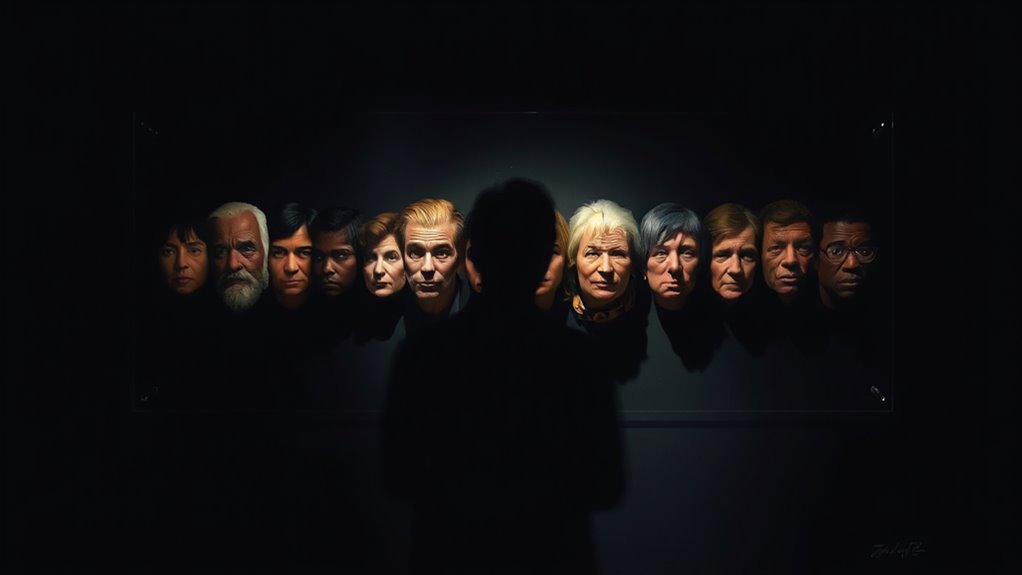
While you might believe your memories are clear and accurate, several factors can profoundly affect their reliability. Understanding these influences can help you navigate situations involving eyewitness testimony. Here are four key factors:
Understanding how various factors influence memory can significantly impact the accuracy of eyewitness testimony.
- Visual aids: Photographs or videos can distort memories, making you believe you remember events differently than they occurred.
- Leading questions: The way questions are posed during cross-examination can shape your recollection, introducing biases.
- Time elapsed: The longer the time between the event and your recall, the more details can fade or become altered.
- Witness confidence: Your certainty about your memory can mislead others into thinking it’s more accurate than it actually is.
Being aware of these factors can enhance your understanding of the complexities of eyewitness memory.
The Impact of Stress on Memory Recall
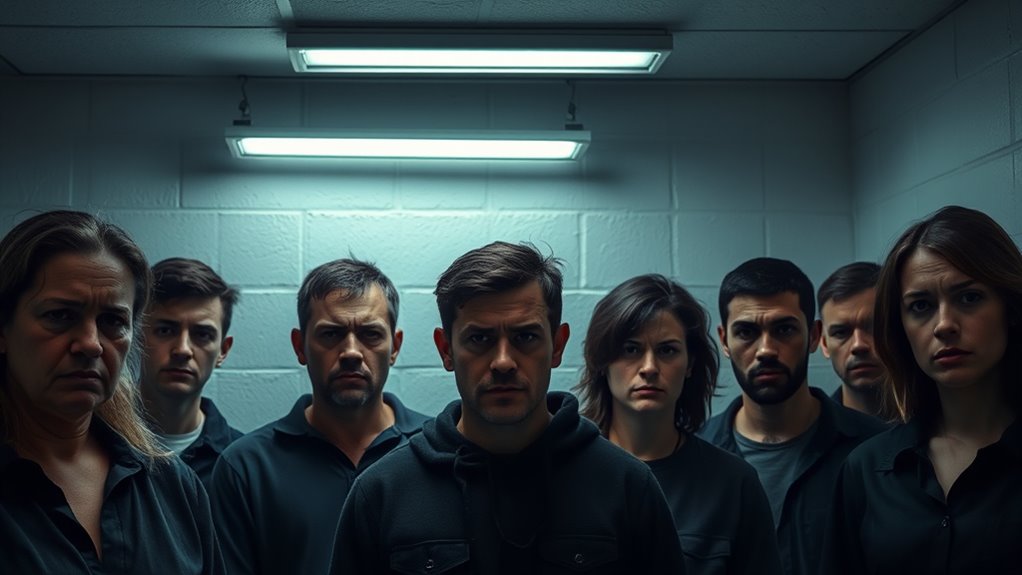
Stress can markedly affect how you recall events, adding another layer of complexity to eyewitness memory. When you’re under pressure, your brain responds to stress with heightened adrenaline effects, which can enhance your focus on certain details while distorting others. This stress-induced memory distortion can lead to inaccurate or selective recall of what happened. For instance, you might remember a vivid detail of the environment but forget essential aspects, like the perpetrator’s appearance. The intensity of the stress experienced during an event plays a significant role in how well you’ll remember it later. Understanding these dynamics helps highlight the importance of creating low-stress environments during eyewitness interviews to improve the accuracy of memory retrieval. Additionally, research shows that crowdsourced ideas can lead to innovative solutions for improving memory recall techniques. Engaging in music therapy has been shown to enhance emotional well-being, which may aid in better memory retrieval under stress. Similarly, employing self-watering features in plant care can help maintain greenery with less stress on the gardener, drawing a parallel to how stress management can positively influence memory recall. Furthermore, fostering a digital-friendly environment can also support overall cognitive function, which may further enhance memory recall abilities. It is also important to recognize that eucalyptus oil possesses calming properties that may help alleviate anxiety during stressful recall situations.
Suggestive Questioning and Its Consequences
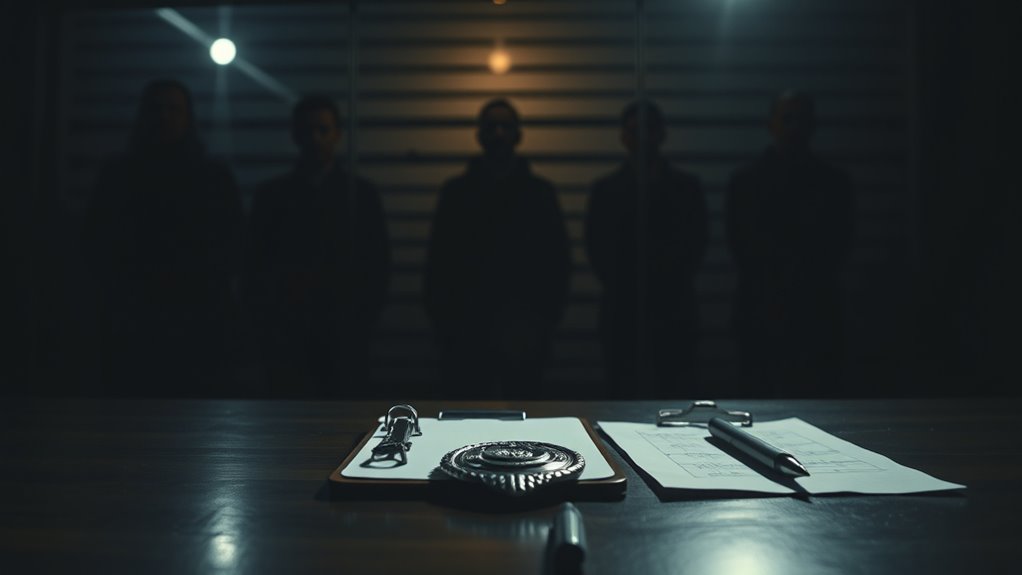
When you think about eyewitness accounts, consider how leading questions can shape your memories. These questions don’t just prompt recall; they can actually alter what you believe you saw. Plus, suggestive feedback from others can further distort your memory, making it vital to understand these influences. The impact of suggestive questioning can significantly cloud the accuracy of eyewitness testimonies. Additionally, the prevalence of over 40% of marriages that end in divorce highlights the importance of reliable testimonies in legal proceedings, particularly when emotions run high.
Impact of Leading Questions
Leading questions can considerably distort eyewitness memories, often shaping the way individuals recall events. You might not realize how much these suggestive queries can affect your perceptions, leading to significant memory distortion. Here are some ways leading questions impact you:
- Altered Details: They can introduce inaccuracies in your recollection. For instance, just as seasonal events can affect a person’s emotional state, leading questions can evoke similar feelings that may distort memory. Shifting your focus unexpectedly can alter your recall, much like how changing gears on a bike can affect your momentum. This is akin to how penetration testing can reveal vulnerabilities in a system, highlighting the fragility of memory. In legal contexts, just like the process of obtaining a divorce online, the nuances of questioning can significantly alter the outcomes based on the reliability of witness statements.
- Confidence Levels: You may become overly confident in false memories.
- Perception Biases: Your judgment can be swayed by the phrasing of a question.
- Emotional Influence: They can evoke strong emotions that cloud your memory. Additionally, the use of suggestive questioning is a common technique that can exacerbate these issues.
Memory Reconstruction Effects
Suggestive questioning doesn’t just alter specific details; it fundamentally reshapes how you reconstruct memories. When you encounter leading questions, you’re likely to visualize scenarios that never occurred, which can distort your recollection. This reshaping often results in memory decay, where the original details fade away, replaced by these new, misleading images. You might start to believe these altered memories are accurate, affecting your confidence in what you remember. To combat this, employing visualization techniques can help anchor your memories in reality, allowing you to differentiate between what you genuinely witnessed and what’s been suggested. Additionally, creating a cozy environment can enhance the clarity of your memories by reducing stress and distractions. Understanding the importance of balanced meals is also crucial, as a healthy diet can influence cognitive function and memory retention. Ultimately, being aware of the power of suggestive questioning can help you preserve the integrity of your memories. Additionally, understanding the importance of risk assessment tools can aid in evaluating the reliability of your recollections in high-stakes situations. It’s crucial to recognize how Halloween traditions can influence collective memories during community celebrations. Furthermore, engaging in philosophical exploration can deepen your understanding of the complexities of memory and perception.
Influence of Suggestive Feedback
Because feedback can shape your perceptions, suggestive comments after an event can profoundly alter your memory of it. This suggestive feedback can lead to significant memory distortion. Here are some ways it can happen:
- Leading Questions: Questions that imply specific answers can mislead you.
- Confirmation Bias: You might start to remember details that align with the feedback you receive.
- Social Pressure: If others express certainty about certain details, you may doubt your own memories.
- Reconstructive Memory: Your brain may fill in gaps with incorrect information based on suggestions.
Being aware of these influences can help you understand how fragile your memories can be and the importance of critical thinking when recalling events.
The Lineup Process: Best Practices and Pitfalls

When conducting a lineup, ensuring fairness and accuracy is essential for obtaining reliable eyewitness identifications. You have two main options: a simultaneous lineup or a sequential lineup. In a simultaneous lineup, witnesses view all suspects at once, which can lead to comparison and potential misidentifications. On the other hand, a sequential lineup presents suspects one at a time, reducing the chance of relative judgment but may increase the risk of missing the correct identification. Regardless of the method, it’s important to use fillers that resemble the suspect and to avoid suggestive instructions. Additionally, documenting the witness’s confidence level immediately after the identification can provide context for the reliability of the memory. Following these best practices helps minimize pitfalls in the lineup process.
Case Studies: Eyewitness Misidentifications

Let’s look at some notable cases of eyewitness misidentification and how they’ve shaped our understanding of memory. You’ll see how various factors can lead to errors, impacting not just the individuals involved but the entire justice system. These examples highlight the critical need for reform in how we handle eyewitness testimony.
Notable Misidentification Cases
How often do you consider the impact of eyewitness misidentifications on the justice system? These cases highlight serious flaws that can lead to wrongful convictions. Here are four notable examples:
- Ronald Cotton – His wrongful conviction was primarily due to faulty eyewitness confidence, despite his eventual exoneration.
- Jennifer Thompson – Misidentified a man in a cross-racial identification case, leading to his imprisonment for years.
- Anthony Ray Hinton – Spent nearly 30 years on death row due to unreliable eyewitness accounts.
- Michael Morton – Wrongfully convicted based on eyewitness misidentification; he was exonerated after decades.
These cases remind us of the critical need to scrutinize eyewitness evidence in criminal justice, especially regarding confidence and racial dynamics.
Factors Influencing Errors
Eyewitness misidentifications are influenced by various factors that can lead to errors in testimony. Stress during a crime, the presence of weapons, and poor lighting can impair your ability to accurately recall details. Additionally, suggestive questioning or the use of visual aids during lineup procedures can distort your memory. When you’re cross-examined, your confidence in your identification might be challenged, further complicating your recollection. Factors like racial bias and familiarity with the perpetrator can also skew your perception, leading to mistaken identifications. It’s vital to understand these influences, as they highlight the fragility of human memory and its susceptibility to error, ultimately impacting the reliability of eyewitness accounts in legal settings.
Impact on Justice System
While various factors can lead to eyewitness misidentifications, the consequences for the justice system are profound and often tragic. Here are four key impacts:
- Wrongful Convictions: Innocent individuals may be imprisoned based solely on faulty eyewitness accounts.
- Juror Bias: Jurors often place undue weight on eyewitness testimony, leading to skewed verdicts.
- Public Confidence: High-profile cases of misidentification erode trust in the justice system.
- Need for Eyewitness Training: Implementing rigorous training for law enforcement can help reduce errors in identifications.
Reforming Eyewitness Testimony in the Legal System
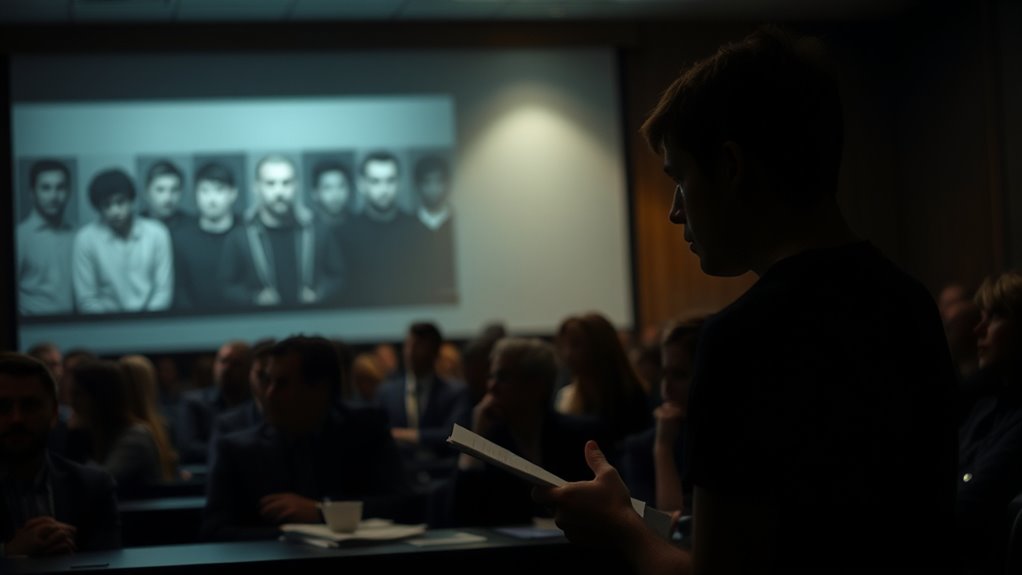
Reforming eyewitness testimony in the legal system is essential for ensuring justice and reducing wrongful convictions. You need to recognize that memory consolidation can be influenced by various factors, leading to distorted recollections. It’s vital to implement stricter guidelines for how witnesses are questioned and how lineups are conducted. By minimizing cognitive biases, like suggestive questioning or leading comments, you can help enhance the reliability of eyewitness accounts. Education and training for law enforcement officials will also play a meaningful role in this reform. When witnesses feel more comfortable and confident, their memories can be more accurately represented in court. Ultimately, these changes can notably improve the integrity of the justice system and protect the innocent.
Frequently Asked Questions
How Does Age Affect Eyewitness Memory Reliability?
Age critically affects eyewitness memory reliability due to developmental differences and memory maturation. Younger individuals often struggle with recalling details accurately, as their cognitive skills are still developing. As you age, your ability to process and retain information improves, leading to more reliable memories. However, older adults might also face challenges, as cognitive decline can impact their recall. Overall, age plays a vital role in how effectively you remember events.
Can Eyewitness Testimony Be Completely Trusted in Court?
You can’t completely trust eyewitness testimony in court. While it might seem convincing, memory distortion often occurs, affecting the reliability of what witnesses recall. Just because someone feels confident about their account doesn’t guarantee its accuracy. Many factors, like stress and suggestion, can distort memories, leading to false recollections. So, while eyewitnesses can provide valuable information, it’s essential to weigh these issues before relying solely on their testimony in legal matters.
What Role Does Media Play in Shaping Memory?
Media’s like a painter, brushing vivid strokes over your memories. It shapes what you recall, often distorting reality through sensationalized stories and images. When you consume news or entertainment, you’re not just watching; you’re absorbing influences that can cloud your memory. Those influences can lead to memory distortion, making you believe events happened differently than they did. So, be aware of how the media can subtly reshape your recollections.
How Often Do Eyewitnesses Misidentify Suspects?
Eyewitnesses misidentify suspects more often than you might think, with studies showing that around 30% of identifications can be incorrect. This misidentification often stems from memory distortion, where your brain fills in gaps with inaccurate details. Even when someone confidently identifies a suspect, it doesn’t guarantee confession accuracy. Factors like stress, suggestive questioning, or misleading information can profoundly influence your memory, leading to errors that could impact justice.
Are There Legal Protections for Eyewitnesses During Testimonies?
Yes, there are legal rights and testimonial protections for eyewitnesses during testimonies. Courts ensure that eyewitnesses are treated fairly and that their testimonies are dependable. You can expect legal safeguards, like the right to legal counsel and protections against coercion. Additionally, judges may instruct juries on how to evaluate eyewitness reliability, helping to minimize potential biases. These measures aim to uphold justice while respecting the integrity of the eyewitness’s account.
Conclusion
So, the next time you find yourself in a police lineup, remember: your memory’s as reliable as a kid’s diary. After all, who needs truth when you can have a good story? With stress, suggestive questions, and a sprinkle of pressure, you might just identify the wrong person—and that’s just the way the legal system likes it! Don’t worry; it’s all part of the fun game we call justice. Who needs accuracy when we have entertainment, right?









